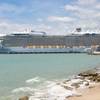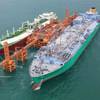Implementation of the U.S. Coast Guard’s program to replace and modernize over 90 ships and 200 aircraft used in its offshore missions - including drug and migrant interdiction, homeland security and fisheries law enforcement - will be the topic of a Congressional oversight hearing on Wednesday.
The hearing by the U.S. House Subcommittee on the Coast Guard and Maritime Transportation, chaired by U.S. Rep. Frank LoBiondo (R-NJ), is scheduled to begin at 2 p.m. on Wednesday, April 20th in 2167 Rayburn House Office Building. A live webcast of the hearing will be available at the Committee’s website:
www.house.gov/transportation
Wednesday’s Witness List
- Admiral Thomas A. Collins, Commandant, United States Coast Guard
Accompanied by Rear Admiral Patrick M. Stillman, Program Executive Officer, Coast Guard Integrated Deepwater System, United States Coast Guard
- Margaret Wrightson, Director of Homeland Security and Justice Issues, Government Accountability Office
The Integrated Deepwater System Program
The Coast Guard began planning a recapitalization program to replace existing deepwater-capable assets in 1996. The Coast Guard’s legacy fleet of vessels and aircraft are nearing or have already reached the end of their service lives, are technologically limited, and are expensive to operate because of relatively high crew requirements.
On June 25, 2002, the Department of Transportation announced the award of a multi-year contract for Deepwater. The contract provides for a fleet of new ships, aircraft and improved command and control systems that will enhance the Coast Guard’s capability to perform their varied traditional and homeland security missions.
The original Deepwater procurement schedule anticipated the delivery of all assets within 20 years; however the contract is authorized to be extended up to 30 years to allow the contractor to continue implementing the program.
The Coast Guard’s Deepwater build-out plan was based on a 20-year projected funding stream of $500 million (in 1998 dollars) per year beginning in fiscal year 2003. In addition to the annual $500 million acquisition cost there is approximately $25 million (in 1998 dollars) in government program fees required to administer a project of this magnitude on an annual recurring basis. However, Deepwater has suffered from budget requests and appropriations that fall below the projected funding level, resulting in the project operating below planned funding levels since its inception.
Administration budget requests have not factored in inflation and program management fees, and until fiscal year 2004, Congress had appropriated less than the requested amounts. Congress authorized a funding level of $1.1 billion for the Deepwater program in fiscal year 2005; however only $724 million was appropriated for the current fiscal year.
The program is facing serious challenges remaining both on schedule and on budget. The Coast Guard has experienced increasing maritime homeland security operational requirements, as well as maintenance and repair costs associated with rapidly deteriorating legacy assets. Declining operational capabilities of the assets responsible for protecting our maritime borders and carrying out other Coast Guard deepwater missions may dictate a need to bring Deepwater assets online sooner than currently planned.
Revised Deepwater Implementation Plan
The original Deepwater build out plan was developed well before September 11, 2001. Since that time, the Coast Guard has been transferred to the Department of Homeland Security (DHS) and has assumed lead federal responsibilities for maritime homeland security in addition to the Service’s many traditional missions. The Coast Guard has determined that modifications to the design and production of key assets are necessary to meet evolving homeland security demands and the requirements of carrying out the Service’s many missions in a post 9/11 environment.
On March 25, 2005, the Coast Guard submitted a Revised Deepwater Implementation Plan that proposed an amended baseline and a modified acquisition schedule for the Deepwater program. Under the revised plan, the total cost of the Deepwater program would increase to an estimated total of $19-24 billion (in 2002 dollars) from the previous funding level of $15 billion. The revised plan also includes a modified acquisition schedule that would require funding over a 20-25 year period (completion in 2021-2026), up from the original 20-year schedule. The modified acquisition schedule includes detailed delivery information for fiscal years 2006-2011; however no information is included for the schedule or order of delivery for Deepwater assets beyond this period.
The revised plan makes a number of changes to the specifications of the assets that are to be procured under the Deepwater program. The plan also suggests that the Coast Guard may procure a fewer number of each individual asset due to the enhanced capabilities that would be added to each platform.
Rapid Decline Of Coast Guard Assets
As part of the original Deepwater program, the Coast Guard included funding to sustain legacy assets until the time when those assets were scheduled to be replaced with assets that were acquired under the program. However, the Coast Guard has suffered a rapid deterioration of legacy assets in recent years. As a result, funding for the Deepwater program has been diverted from the already slowed asset replacement schedule to maintain these increasing numbers of failing legacy assets. This, coupled with shortfalls in appropriated funding levels and increasing maritime homeland security operations, has accelerated the impacts of this downward spiral, increased costs to sustain the old assets, and reduced funds available for new assets.
Subscribe for
Maritime Reporter E-News
Maritime Reporter E-News is the maritime industry's largest circulation and most authoritative ENews Service, delivered to your Email five times per week










